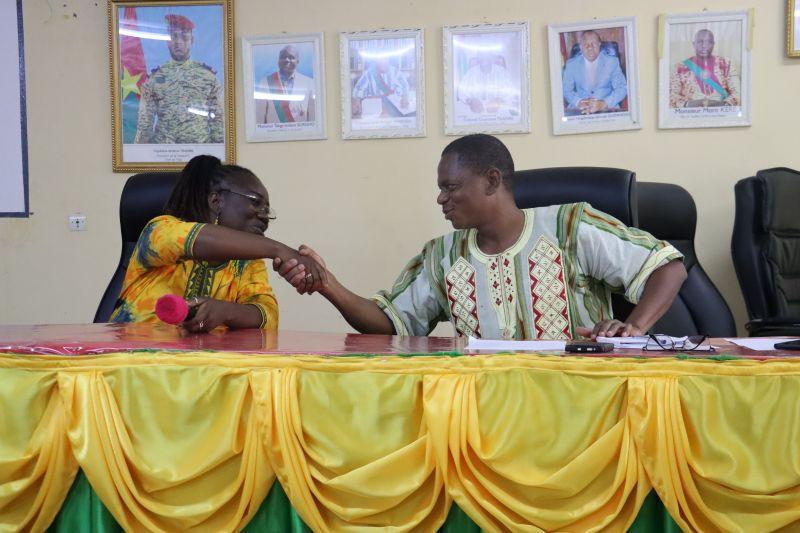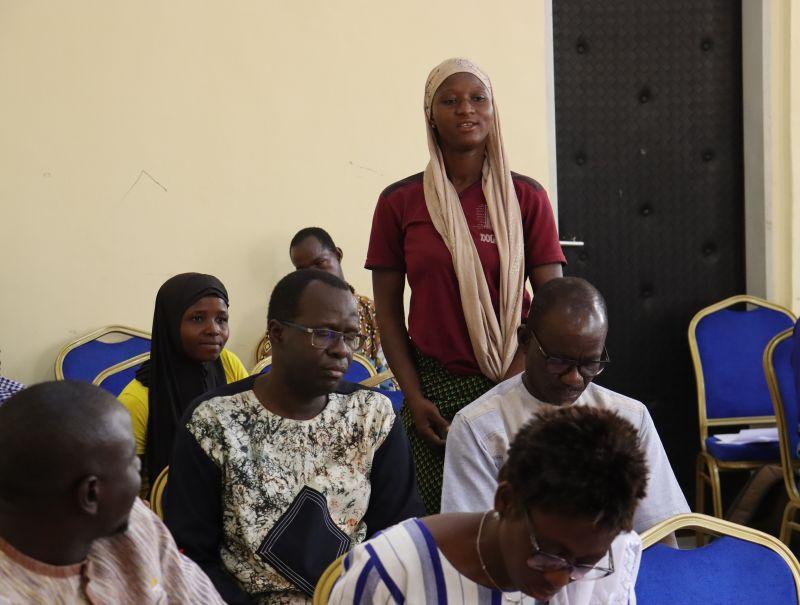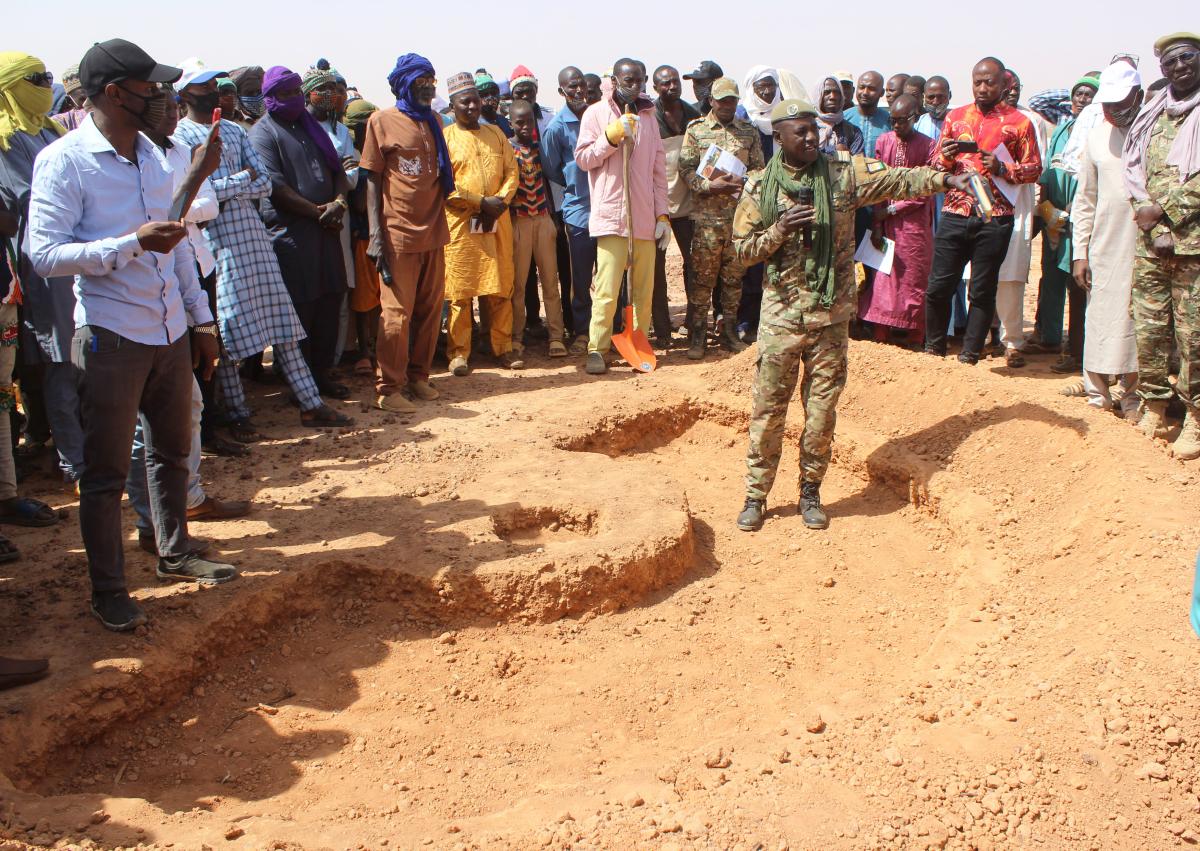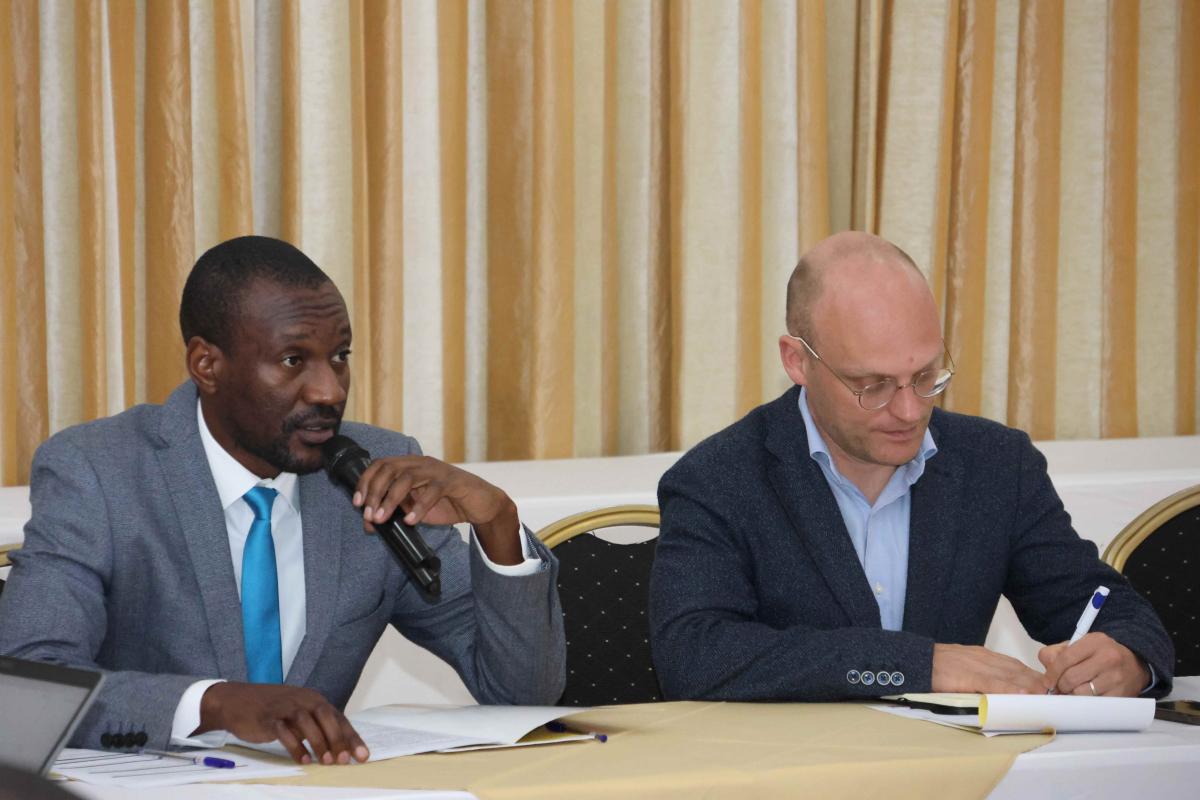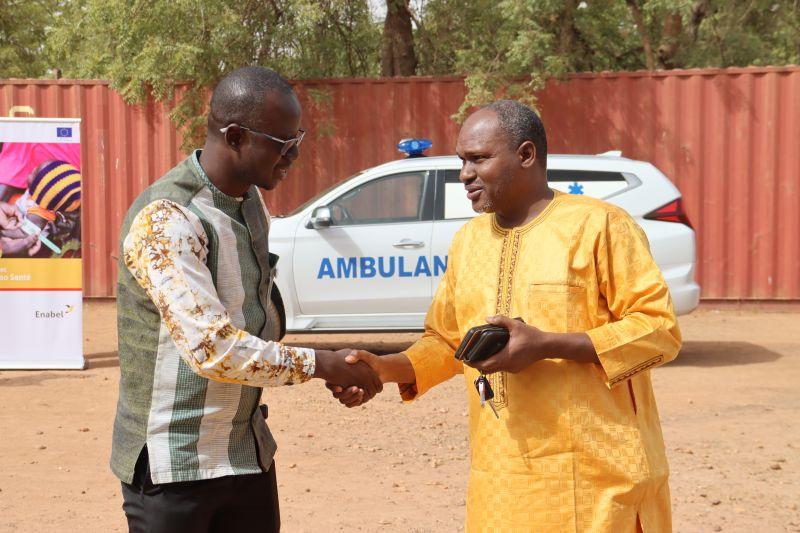Opzoeken
465 - 480 van 3113 nieuws bekijken
-
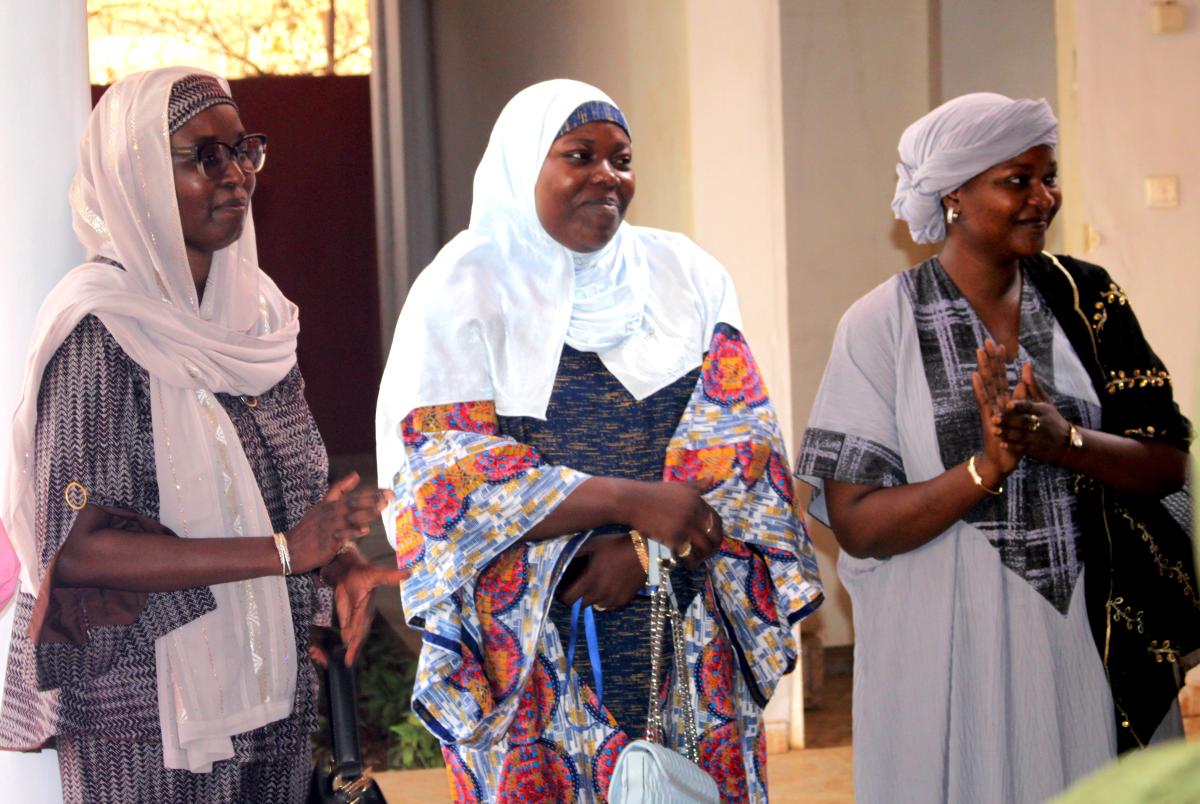
Au Niger, elles brisent les barrières : portrait de trois femmes inspirantes
Halissa HASSAN DAN AZOUMI | 19/03/2025
Trois femmes mises à l’honneur à l’occasion de la journée internationale des droits des femmesEnabel au Niger s'est jointe à la commémoration annuelle de la journée internationale des droits des femmes du 8 mars 2025, réaffirmant ainsi son engagement en faveur de l'égalité des genres et des droits des femmes. Cette journée a été l'occasion de mettre à l'honneur trois femmes exceptionnelles, qui chacune à leur manière, contribuent activement à changer les mentalités et à transformer la société.Aicha Macky, réalisatrice nigérienne multiprimée, a captivé l'attention avec son parcours inspirant. Lauréate du Prix du Public du Prix Awa 2024, Aicha est également productrice avec son entreprise Tabous Production et membre de l'Academy des Oscars, Un exemple de persévérance et de talent dans un domaine où les femmes sont encore sous-représentées.Halimatou Zika, Présidente de la Cellule Nigérienne des Jeunes Filles leaders (CNJFL) a quant à elle mis en avant son expertise en genre et changement climatique. Son travail est essentiel dans la lutte pour l'autonomisation des femmes et des jeunes filles, notamment dans le contexte des défis environnementaux du Sahel. Ami Bickou, Directrice fondatrice de la laiterie fromagerie Amansi, une entreprise de transformation laitière nigérienne, 100 % naturel du lait cru.En 2024, elle remporte le 4ᵉ prix du PastorHackathon avec sa solution novatrice pour améliorer la commercialisation du lait local. Elle brise les stéréotypes et inspire de nombreuses femmes à prendre leur place dans le monde des affaires.Au programme de la journée, un jeu interactif pour clarifier les valeurs liées à l'égalité des genres, une discussion enrichissante avec les invitées et la projection d'une vidéo mettant en lumière les actions d'Enabel au Niger pour combattre les inégalités pour les femmes et les jeunes filles.Cette journée a rappelé l'importance de continuer à se battre pour l'égalité et la dignité des femmes, malgré les défis persistants dans de nombreuses régions du monde. Enabel au Niger et ses invités ont réaffirmé leur engagement dans ce combat.
-
Enabel au Burkina Faso lance 6 nouveaux projets dans le Centre-Est et le Plateau Central
Geoffroy ZONGO | 18/03/2025
Enabel, l'Agence belge de développement et ses partenaires ont procédé ce jeudi 6 mars 2025 au lancement conjoint de 6 nouveaux projets dans le Centre-Est et le Plateau Central. Cet événement s’est déroulé dans la salle du Conseil Régional du Centre-Est à Tenkodogo et a été présidé par le Gouverneur de la Région du Centre-Est. Cette cérémonie représente une étape impérative dans la mise en œuvre du Programme de coopération bilatérale entre le Burkina Faso et la Belgique pour la période 2023-2027. Lors de cet événement, les parties prenantes, bénéficiaires et autorités locales ont pu découvrir les différents projets mis en œuvre, notamment : Le Projet de Structuration des Filières Agricoles porté par le consortium PPI, Rikolto et INADES, ce projet cible les filières riz, arachide, maraîchage et PFNL.Le Projet d’Action Conjointe pour une Transition Agroécologique exécuté par l’IRSAT, ce projet promeut une agriculture durable.Le Projet d’Amélioration de l’Accès aux Semences de Variétés Améliorées mis en œuvre par l’INERA, ce projet vise à optimiser les rendements agricoles. Le Projet de Soutien à la Sécurité Alimentaire et à l’Intégration des Femmes et Jeunes dans les Chaînes de Valeur Agricoles conduit par les DRARAH du Centre-Est et du Plateau Central, ce projet soutient la sécurité alimentaire. Le Projet de Renforcement des Offres Financières Inclusives pour l’Entrepreneuriat Durable et Équitable (PROFIDE) piloté par Trias, ce projet améliore l’accès au financement des entrepreneurs. Le Projet d’Appui à l’Autonomisation du Centre d’Innovation pour un Entrepreneuriat Inclusif et Innovant mené par le consortium CEAS BF et WakatLab, ce projet soutient l’entrepreneuriat inclusif et innovant. Dans son allocution, le Gouverneur a exprimé sa gratitude envers Enabel et ses partenaires pour leur engagement en faveur du développement des régions concernées. Il a souligné l’importance de la synergie et de la collaboration entre les acteurs locaux afin d’assurer la pérennité des actions entreprises. Il a également insisté sur la nécessité d’un suivi rigoureux et d’une évaluation constante des actions mises en œuvre pour garantir une gestion efficace des ressources et maximiser l’impact positif des projets. « La mise en œuvre de ces projets contribuera sans aucun doute à dynamiser notre économie locale et à renforcer les capacités des acteurs engagés dans le développement de nos régions. C’est ensemble, à travers une collaboration étroite et une mobilisation collective, que nous garantirons la réussite de ces initiatives », a-t-il déclaré. Cet événement marque le début d’une nouvelle dynamique de développement régional avec des initiatives adaptées aux réalités locales et aux besoins des populations. L’ensemble des parties prenantes s’est engagé à jouer pleinement son rôle pour assurer le succès des projets et contribuer à l’amélioration des conditions de vie des populations.Pour rappel, signée le 25 octobre 2023, la convention de coopération entre les deux pays vise à renforcer la résilience socioéconomique, l’accès aux services sociaux de base et la cohésion sociale des populations vulnérables (notamment les jeunes, les femmes et les personnes marginalisées). Structuré autour de cinq priorités clés (la résilience socio-économique, la cohésion sociale, l'accès aux services sociaux de base, la gouvernance locale et l'égalité de genre), ce programme entend répondre aux défis majeurs du développement dans les régions du Centre-Est et du Plateau Central. Le lancement officiel de ces projets symbolise l’engagement du Burkina Faso et de la Belgique à œuvrer ensemble pour un avenir plus résilient, inclusif et prospère.
-
Burkina Faso : Pour un accès inclusif aux services de santé sexuelle et reproductive
Geoffroy ZONGO | 18/03/2025
Enabel aux côtés de ses partenairesLe 4 mars 2025, Enabel, l'Agence belge de développement, en collaboration avec l'ONG ASMADE, a organisé un atelier d'information à Tenkodogo. Cette activité a réuni les autorités régionales et locales ainsi que divers partenaires pour échanger sur l'accès inclusif et équitable aux services de santé sexuelle et reproductive (SDSR) destinés aux personnes déplacées internes (PDI) et aux communautés hôtes. L’initiative s’inscrit dans le cadre du programme bilatéral belgo-burkinabé 2023-2027, mis en œuvre par Enabel. Présidé par le Gouverneur de la région du Centre-Est, représenté par son homologue du Plateau Central, cet atelier avait pour principal objectif de présenter les activités du projet aux parties prenantes et de recueillir leurs contributions pour une mise en œuvre participative et inclusive. Il a permis de présenter les zones d’intervention, à savoir les chefs-lieux des districts sanitaires de Zorgho, Koupéla, Tenkodogo et Pouytenga; d’expliquer l’approche participative et inclusive du projet ; de valider les critères de sélection des localités et des animateurs endogènes ainsi que de clarifier les rôles et responsabilités des parties prenantes. Durant cette rencontre, les participants ont assisté à des présentations détaillées sur les interventions prévues, les critères de sélection des zones et des animateurs, ainsi que les objectifs du projet. Ce fut également l’occasion pour l’ONG ASMADE, partenaire de mise en œuvre, d’exposer les étapes concrètes de réalisation du projet sur le terrain et d’expliquer comment il entend renforcer l’appropriation des services SDSR par les communautés bénéficiaires. Enabel joue un rôle central dans ce programme en apportant un soutien financier et technique essentiel à la mise en œuvre des activités. À travers ce programme, l'agence confirme son engagement à renforcer la résilience socio-économique, l’accès aux services sociaux de base et la cohésion sociale des populations vulnérables au Burkina Faso. Son appui permet d’assurer que les interventions menées sont inclusives, équitables et durables. L’atelier a permis de clarifier les attentes des différents acteurs et de recueillir des recommandations visant à améliorer l’efficacité des actions sur le terrain. À l’issue des échanges, les critères de sélection des localités et des animateurs endogènes ont été validés, les rôles et responsabilités des parties prenantes ont été précisés et les contributions des participants ont été intégrées pour un renforcement des synergies. Aussi, les bases d’une mise en œuvre réussie du projet ont été posées. L’adhésion des autorités locales et l’engagement des partenaires, en particulier Enabel, sont des éléments clés pour garantir un accès inclusif et équitable aux services de SDSR pour les PDI et les communautés hôtes. Cette dynamique collaborative constitue un levier essentiel pour la réussite du programme et l’amélioration durable des conditions de vie des populations concernées.
-
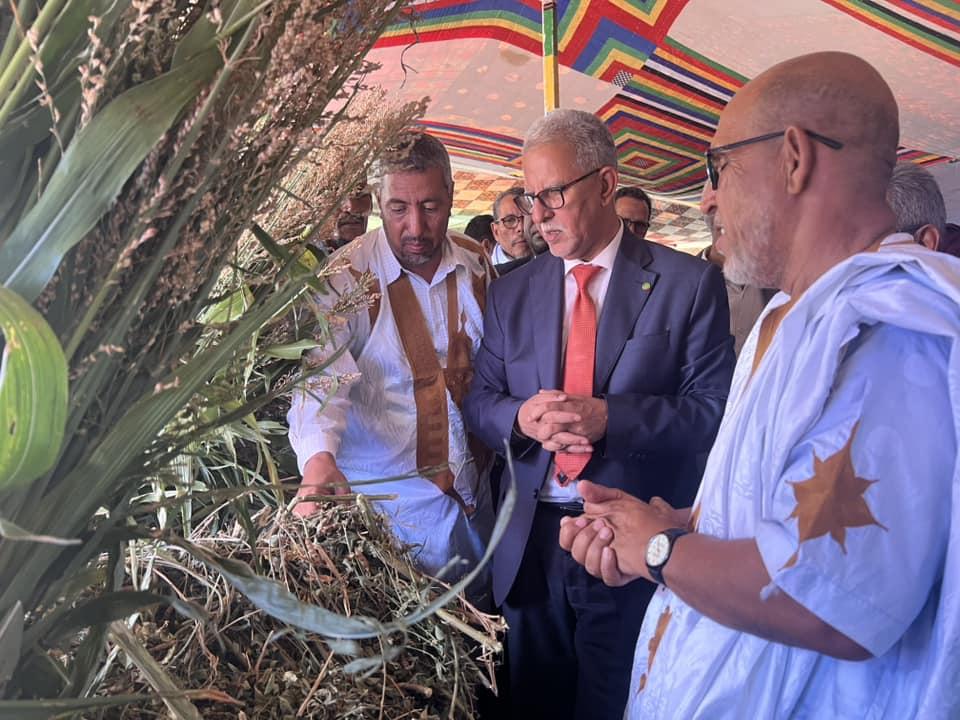
Mauritanie: Valorisation de nos pratiques agricoles novatrices lors de l’Exposition Agricole de l’Assaba !
Aminata KANE | 18/03/2025
Enabel, avec le soutien de l’Union européenne, continue d’accompagner les communautés locales en Mauritanie pour renforcer leur résilience agricole et pastorale. À l'occasion de la première exposition de produits agricoles organisée dans la wilaya de l’Assaba, les réussites des Jardins Maraîchers Circulaires et des Facilitateurs Pastoraux ont été mises en avant, témoignant de l'impact concret des actions sur le terrain. Les résultats de nos Jardins Maraîchers Circulaires ont suscité un vif intérêt grâce à leur approche innovante et durable pour le développement des cultures maraîchères. De leur côté, les Facilitateurs Pastoraux de Guerou et Kankossa ont exposé les fourrages produits localement, démontrant l'importance de la production locale pour la sécurité alimentaire.Cet événement de grande envergure, présidé par le délégué général à la Solidarité Nationale et à la Lutte contre l’Exclusion “Taazour”, M. Cheikh Abdallahi Bedda, en présence du ministre de l’Agriculture et de la Souveraineté Alimentaire, M. Mommé Ould Beibattai, et du wali de l’Assaba, a rassemblé de nombreuses fédérations agricoles et partenaires. Les agriculteurs ont saisi cette opportunité pour partager leurs réussites, mais aussi les défis auxquels ils font face, notamment en matière d’irrigation, d’engrais, de clôtures et de stockage.Cette exposition a permis de valoriser les pratiques agricoles novatrices et d’encourager l’autosuffisance alimentaire. Enabel et ses partenaires restent engagés aux côtés des communautés pour améliorer la productivité agricole et bâtir un avenir durable et résilient.
-
Niger : cérémonie de lancement des travaux de restauration des terres dégradées
Halissa HASSAN DAN AZOUMI | 17/03/2025
Le 10 mars 2025, a eu lieu, le lancement officiel de la phase 2 des travaux de restauration des terres dégradées pastorales sur le site de Gatwane situé à Simiri dans le département de Ouallam, région de Tillabéry. La cérémonie s’est déroulée en présence de plusieurs autorités, dont le Secrétaire Général adjoint du gouvernorat de Tillabéry, le préfet de Ouallam, ainsi que le chef de canton de Simiri. La population locale était également présente pour l’événement.Ces travaux sont soutenus par le projet ASYPON Grande Muraille Verte (GMV), financé par l’Union européenne et mis en œuvre par Enabel, l’Agence belge de développement. À terme, ils permettront de restaurer 1.375 hectares de terres sur 16 sites différents. Pour cela, 2.250 travailleurs locaux seront mobilisés, dont de nombreuses femmes et jeunes, ainsi que des personnes déplacées internes. Ces travailleur·euses seront rémunéré·es à hauteur de 287 millions FCFA. Les travaux consisteront principalement en la réalisation de demi-lunes sylvopastorales, de plantation d’arbres et d'ensemencements d’espèces fourragères visant à renforcer la résilience de l’écosystème.Après les discours des autorités et des responsables du projet GMV, le Directeur départemental de l’Environnement de Ouallam a expliqué aux travailleur·euses HIMO, les caractéristiques d'une demi-lune. Cette explication leur a permis de bien comprendre comment creuser correctement en respectant les proportions. Les autorités ont ensuite donné le signal de départ en lançant officiellement les travaux avec un coup de pioche.Ce projet suit une phase pilote lancée en 2024, qui avait permis la restauration de 750 hectares, avec la participation de 1.903 travailleurs, dont 997 femmes. Ce travail avait permis de planter 79.245 arbres et 1.771 kg d’espèces fourragères, pour un investissement de plus de 130 millions FCFA et pour une rémunération de la main-d’œuvre locale (travailleur·euses HIMO) de plus de 130 millions FCFA.Les travaux de restauration des terres dégradées à Simiri représentent un espoir pour la lutte contre la désertification et la préservation des écosystèmes au Niger. Ils contribuent également à la création d’emplois locaux et à la promotion d’un avenir plus résilient pour les populations vulnérables. Les autorités locales et les partenaires du projet ont exprimé leur gratitude envers l'Union européenne et Enabel pour leur soutien constant, et ont appelé à l'engagement de tous pour faire de ce projet un modèle de réussite.
-
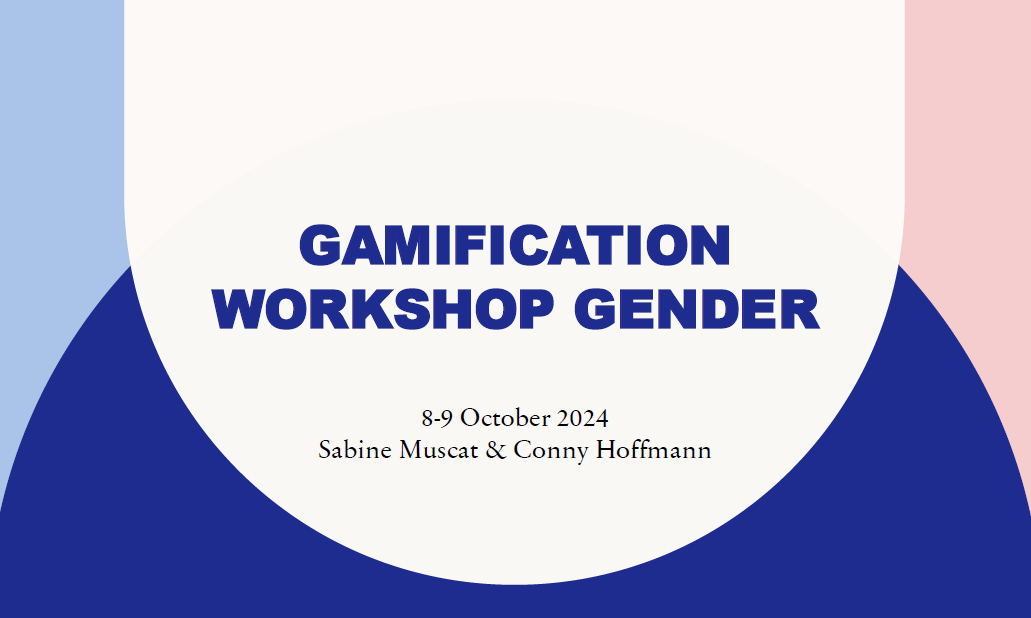
Belgium : Gender Gamification Workshop
Eva COUDYZER | 14/03/2025
The Digital for Girls and Women project, financed by Enabel and supported by the D4D Hub, organized a 2-day capacity building workshop on the topic of Gender-transformative digital cooperation. The workshop took place in Brussels on October 8 and 9 2024. More information can be found here: Gender Gamification Workshop | D4D Access
-
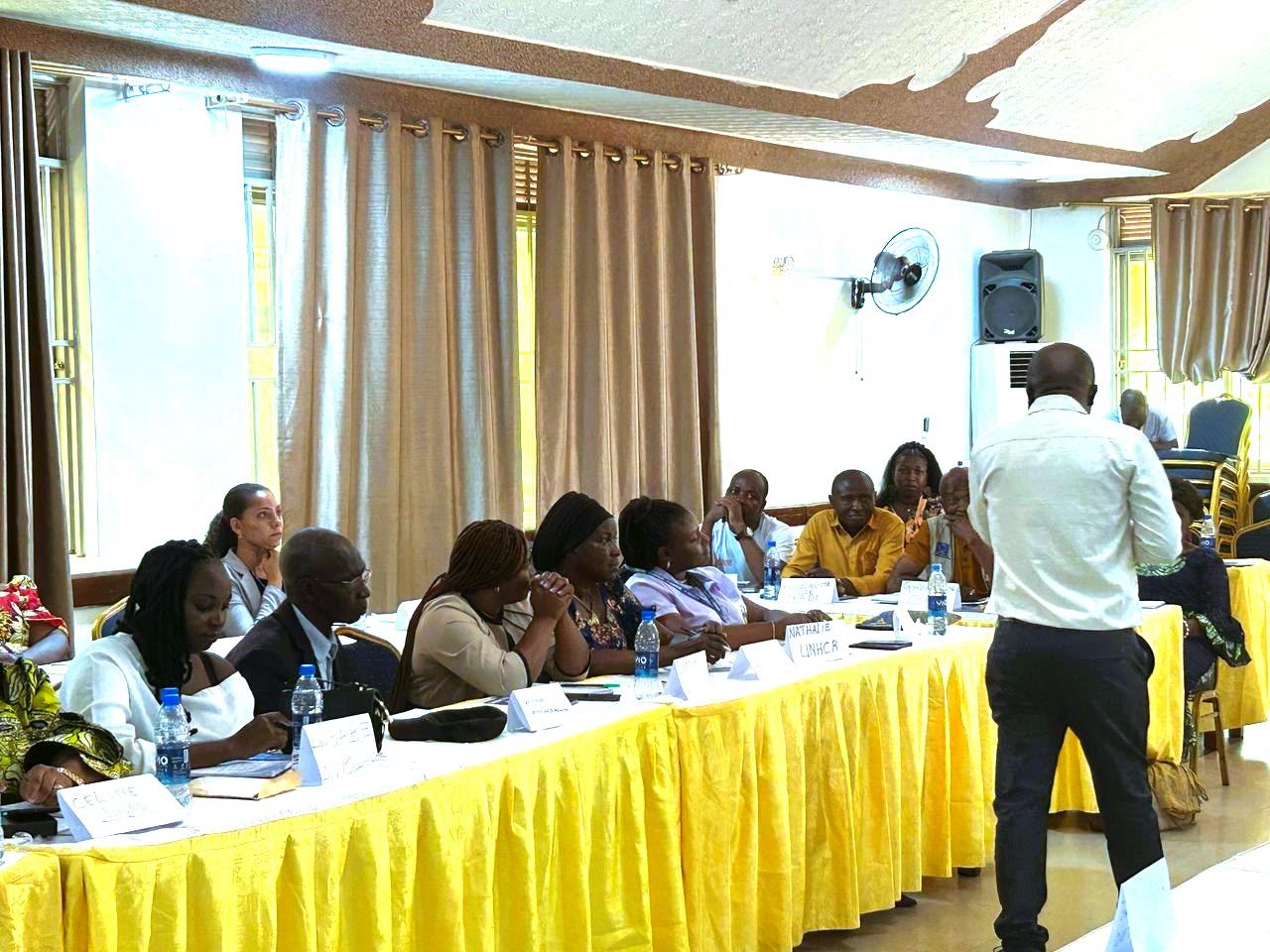
RDC: Six axes stratégiques pour renforcer la lutte contre les violences basées sur le genre
Mandy BAKINE NGASHUE | 14/03/2025
L'Union européenne et Enabel unissent leurs forces pour soutenir la Division genre, famille et enfant dans la lutte contre les VBG.Plus de 130 acteurs se sont réunis à Bunia, en février 2025, pour renforcer la lutte contre les violences basées sur le genre (VBG) en Ituri, une province de la République démocratique du Congo. Cet événement, soutenu par Enabel et financé par l'Union européenne, visait à prioriser l'accompagnement juridique et judiciaire des victimes dans le cadre du Plan de travail annuel (PTA) 2025 de la Division provinciale du Genre, Famille et Enfant. La rencontre s'est déroulée en deux phases : d'abord, une présentation des réalisations de 2024 et une analyse des politiques locales pour identifier les lacunes et les progrès. Ensuite, une présentation détaillée et validation collective du PTA 2025, qui s'articule autour de six axes stratégiques : coordination et leadership, environnement favorable et engagement politique, participation et protection de l'enfant, agenda femme et sécurité, renforcement des mécanismes juridiques, et plaidoyer pour la mobilisation des ressources. Jean-Marc Mazio, expert à la Division provinciale, a souligné l'urgence d'agir face à un système judiciaire fragilisé, avec seulement 340 des 13 000 cas de violences sexuelles ayant reçu un soutien juridique. Les participants à l'atelier ont insisté sur l'importance de la pacification de l'Ituri et de la mobilisation de fonds dédiés, affirmant que la paix est essentielle pour le succès de leurs efforts. Enabel et l’Union européenne apportent un soutien financier et technique pour renforcer les capacités de coordination et de plaidoyer des institutions provinciales. Les recommandations incluent la création de cellules d'accompagnement juridique dans les zones rurales, la formation de juges et policiers, une campagne de sensibilisation, et un plaidoyer pour un fonds dédié à la justice genre-sensitive. Avec le soutien financier de l’Union européenne, Enabel à travers son projet Unis pour l'égalité de genre s'engage à promouvoir la coordination institutionnelle, l'accès à la justice, et l'autonomisation socio-économique des survivantes de VBG, en vue de construire un avenir où la justice et l'égalité de genre sont une réalité pour tous et toutes.
-
Burundi : Adapter nos projets de santé aux nouvelles réalités territoriales
Jonas Eric UWIZERA | 14/03/2025
Rencontre stratégique entre Enabel et le Ministère de la Santé Publique et de la Lutte contre le SidaLe 12 mars 2025, une réunion du Comité de Pilotage (COPIL) entre les équipes des projets MALARIYA PI financé par la Fondation Gates, et NTUSIGARINYUMA volet santé, financé par la Belgique, et ceux du Ministère de la Santé Publique et de la Lutte contre le Sida (MSPLS) s'est tenue à Bujumbura. Le 1er projet (MALARIYA PI) se concentre sur la lutte contre le paludisme, une priorité nationale, tandis que le deuximème (NTUSIGARINYUMA) renforce d'autres aspects du système de santé, garantissant ainsi des résultats intégrés et synergiques. Cette rencontre avait pour objectif de revisiter les actions prévues pour 2025 au sein des deux projets santé et leur réajustement aux nouvelles délimitations territoriales du pays. En effet, à partir de 2025, le Burundi passe de 18 à 5 provinces, et de 119 à 42 communes, conformément à la loi organique n°1/05 du 16 mars 2023, une réforme visant à améliorer l'efficacité administrative et à uniformiser les subdivisions territoriales. Les projets MALARIYA PI et NTUSIGARINYUMA ont adapté leurs stratégies et ont renforcé leur volonté à travailler en synergie avec le Ministère de la Santé publique et de la Lutte contre le Sida afin d’assurer une couverture efficace des services de santé. Cette collaboration étroite avec le Ministère de la Santé témoigne de la volonté d'Enabel et de ses partenaires de soutenir les initiatives gouvernementales en matière de santé, en s'assurant que les interventions répondent aux besoins des populations dans ce nouveau cadre administratif. Notons que le COPIL est composé des acteurs suivants : Enabel, le Ministère de la Santé Publique et de la Lutte contre le Sida et les représentants des instances administratives provinciales, avec une co-présidence entre le Ministère et Enabel.
-
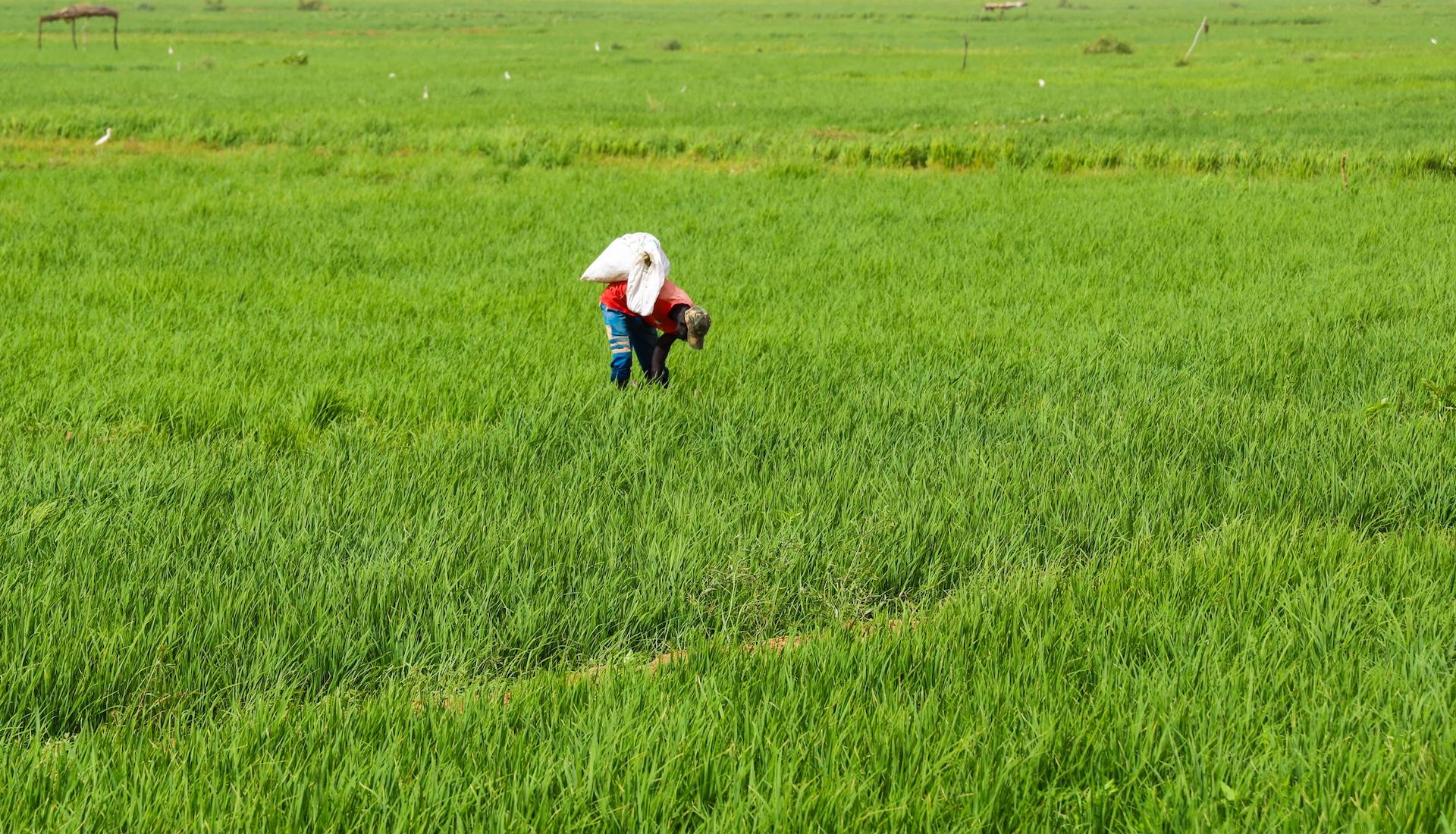
Valoriser la terre, nourrir les générations : la filière rizicole en Mauritanie
Aminata KANE | 13/03/2025
Le projet SECURALIM ambitionne de renforcer la sécurité alimentaire et nutritionnelle en Mauritanie en misant sur le développement de la filière rizicole, essentielle pour répondre aux besoins alimentaires croissants du pays. En réduisant la dépendance aux importations, cette filière stratégique contribue directement à la souveraineté alimentaire nationale.Selon le Ministère de l’Agriculture, la production de riz paddy couvre actuellement entre 80 % et 90 % des besoins du pays. Toutefois, ce potentiel est encore freiné par de nombreux défis : exiguïté des parcelles, difficultés d’accès au crédit, gestion complexe de l’eau, baisse de la fertilité des sols et attaques d’oiseaux.Pour répondre à ces enjeux, SECURALIM met en œuvre des actions structurantes afin d'améliorer la productivité et la résilience des producteurs :L'accès à des semences de qualité grâce au soutien direct à l’ISPM pour accroître sa capacité de production de semences améliorées;Le renforcement des pratiques culturales avec l'introduction de semences performantes, de petite mécanisation et de l'intégration de légumineuses pour enrichir les sols,Les capacités organisationnelles des coopératives à savoir l'amélioration de la gestion foncière en collaboration avec la SONADER pour clarifier les droits et renforcer la structuration,La sécurisation des revenus des producteurs en établissant des relations contractuelles entre riziculteurs et usiniers pour garantir un accès régulier aux intrants et assurer des accords transparents.Des résultats concrets attendus d'ici 2026 :Un appui technique et en gestion pour environ 1.500 producteurs couvrant 4 500 hectares.Une augmentation significative des rendements avec 2 tonnes supplémentaires par hectare, soit une production additionnelle de 18 000 tonnes de paddy.La production de 210 tonnes de semences R1 de riz à haut rendement, capables de couvrir 40 000 hectares, soit le double de la couverture actuelle.Témoignages qui illustrent le changementLes producteurs témoignent déjà de l'impact des nouvelles pratiques et de l'introduction de semences améliorées. Mamadou Tandia, riziculteur au PPG-2 de Kaédi, se réjouit des résultats : « Vous voyez cette levée ? Les nouvelles semences ont donné à plus de 90 %. Nous avons été d’autant plus motivés à planter ces nouvelles variétés, car l’an passé, avec la S177, nos résultats ont dépassé toutes nos attentes. Cette année, la coopérative PPG-2 espère doubler sa production par rapport aux campagnes précédentes, grâce à l'efficacité des nouvelles semences. »De son côté, Babacar Sarr, président de la coopérative rizicole de Gani / Trara, anticipe une récolte exceptionnelle : « La récolte sera au minimum bonne, et probablement exceptionnelle. Avec l’utilisation de ces nouvelles semences, nous visons un rendement réaliste de 5 tonnes par hectare, contre 2 à 3 tonnes auparavant. »Le projet démontre déjà son impact concret sur le terrain, en apportant aux producteurs les moyens d'améliorer durablement leur rendement et leur résilience. Grâce à des innovations agricoles adaptées et un accompagnement technique renforcé, la filière rizicole s’affirme comme un levier essentiel pour garantir la sécurité alimentaire en Mauritanie. Avec l'engagement des producteurs, des partenaires et des coopératives, les résultats obtenus montrent que l’autonomie alimentaire est à portée de main. Ensemble, poursuivons nos efforts pour bâtir une agriculture plus forte et plus durable.
-
Burkina Faso : Enabel renforce l'accès aux soins d'urgence
Geoffroy ZONGO | 13/03/2025
Une nouvelle ambulance à BoromoLe 24 février 2025, Enabel, l'Agence belge de développement, a marqué une grande étape dans son engagement pour l'amélioration des soins de santé au Burkina Faso. Lors d'une cérémonie officielle, Enabel a remis une ambulance neuve et équipée au Centre Médical avec Antenne Chirurgicale (CMA) de Boromo. Cet événement, honoré par la présence du Haut-Commissaire de la province des Balé, du préfet, du Médecin-Chef du district sanitaire, de la présidente de l'association des femmes et de nombreux habitant.es, symbolise une avancée significative dans la lutte contre la mortalité maternelle et infantile.Cette ambulance, financée par l'Union européenne à travers les projets Lasso Santé et Lasso WaSH, permettra d'améliorer la prise en charge rapide des urgences obstétricales et autres cas médicaux critiques. Elle s'inscrit dans la stratégie globale de renforcement du système de santé local mise en place par Enabel au Burkina Faso. Prenant la parole lors de la cérémonie, le Haut-Commissaire des Balé a salué cette initiative en déclarant : « Cette ambulance représente un soulagement pour les populations de Boromo et des localités environnantes. Elle contribuera à sauver des vies, notamment celles des femmes en situation d’urgence obstétricale. Nous remercions chaleureusement Enabel pour cet appui essentiel.»Les habitant.es et les professionnel.les de santé du CMA de Boromo ont également manifesté leur satisfaction et leur reconnaissance. Mme YISSI Fatoumata, présidente de l'association des femmes, a témoigné : « Boromo est très grand, nous ne disposions que de deux ambulances et c’était compliqué pour les interventions. De plus, de nombreuses femmes déplacées sont loin des CMA; cette ambulance pourra les aider pour des interventions rapides. Nous sommes très content.es de ce don. Nous prions Dieu qu'Enabel puisse avoir la force de perpétuer ces bonnes actions au profit des populations. Avec cette ambulance, nous avons espoir que les choses vont s’améliorer. »De son côté, Dr Hyppolyte BOUDA, Médecin-Chef du district sanitaire de Boromo, a expliqué l'impact direct de cette dotation sur la qualité des soins : « le CMA de Boromo est beaucoup sollicité en matière d’évacuation et la difficulté est que les interventions sont longues, car Boromo est à mi-distance entre Ouagadougou et Bobo-Dioulasso. Alors, disposer d'une ambulance est capital pour nos interventions. Ce véhicule nous permettra de réduire les délais d'attente pour les évacuations, d'améliorer la prise en charge des urgences et de diminuer le taux de mortalité, en particulier chez les femmes enceintes et les nouveau-nés. »Cette initiative s’inscrit dans une démarche plus large portée par Enabel, visant à renforcer les infrastructures de santé, améliorer l’accès à l’eau potable et promouvoir les conditions d’hygiène dans les établissements de soins. Comme l’a rappelé M. NYAMBRE Antoine Marie, Chef de projet Lasso Santé : « Cette ambulance n’est pas un geste isolé. Elle s’intègre dans une stratégie globale visant à améliorer le système de référence et à renforcer la santé maternelle et infantile. »Grâce à l'ambulance, c’est un nouveau chapitre qui s’ouvre pour les habitant.es de Boromo. Un chapitre où l’accès aux soins d’urgence n’est plus un privilège, mais un droit pour tous et toutes. Un chapitre où chaque vie compte, où chaque seconde gagnée peut faire la différence. Enabel, à travers cette action, réaffirme son engagement en faveur des communautés les plus vulnérables et démontre que, ensemble, il est possible de construire un avenir où la santé est une priorité absolue.
-
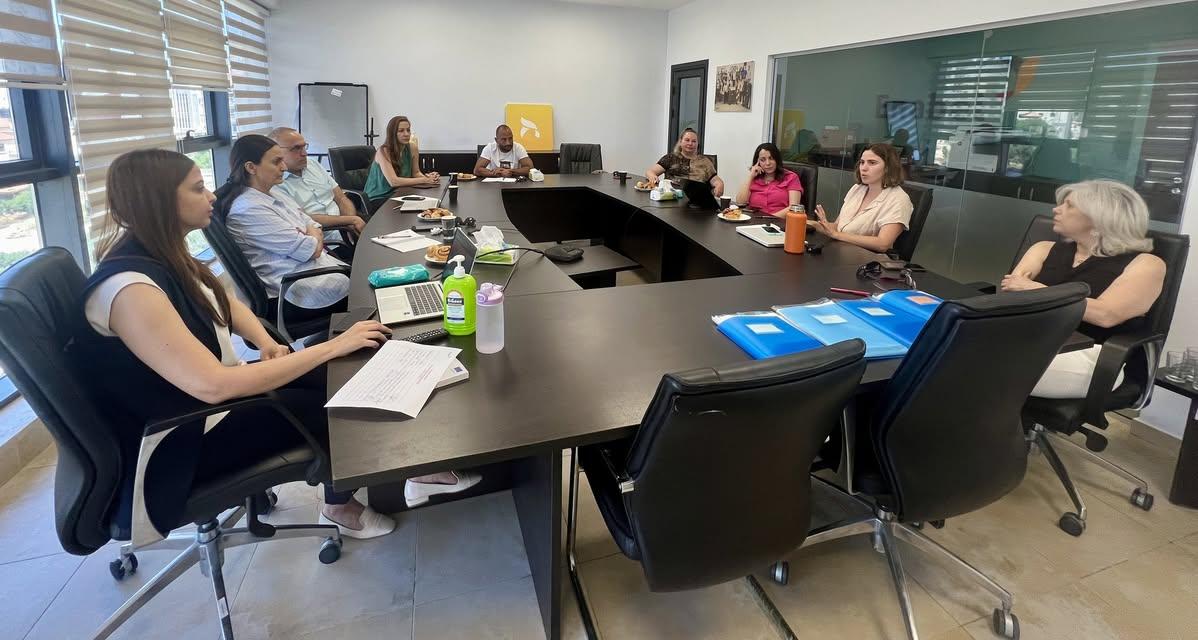
New Grants Launching in Palestine
Arwa ALSHAWWA | 13/03/2025
In July 2024, Enabel was delighted to announce the launch of 4 new grants under Pathway to Employment project in Palestine. These grants specifically focused on empowering women by supporting them to develop sustainable micro or small businesses that enable them to generate income and enhance their economic independence.We extended our appreciation to our new partners, who will play an important role in this project: The Palestinian Businesswomen's Association (Asala)B-Hub (Birzeit University)YMCA Jerusalem Community Center.
-
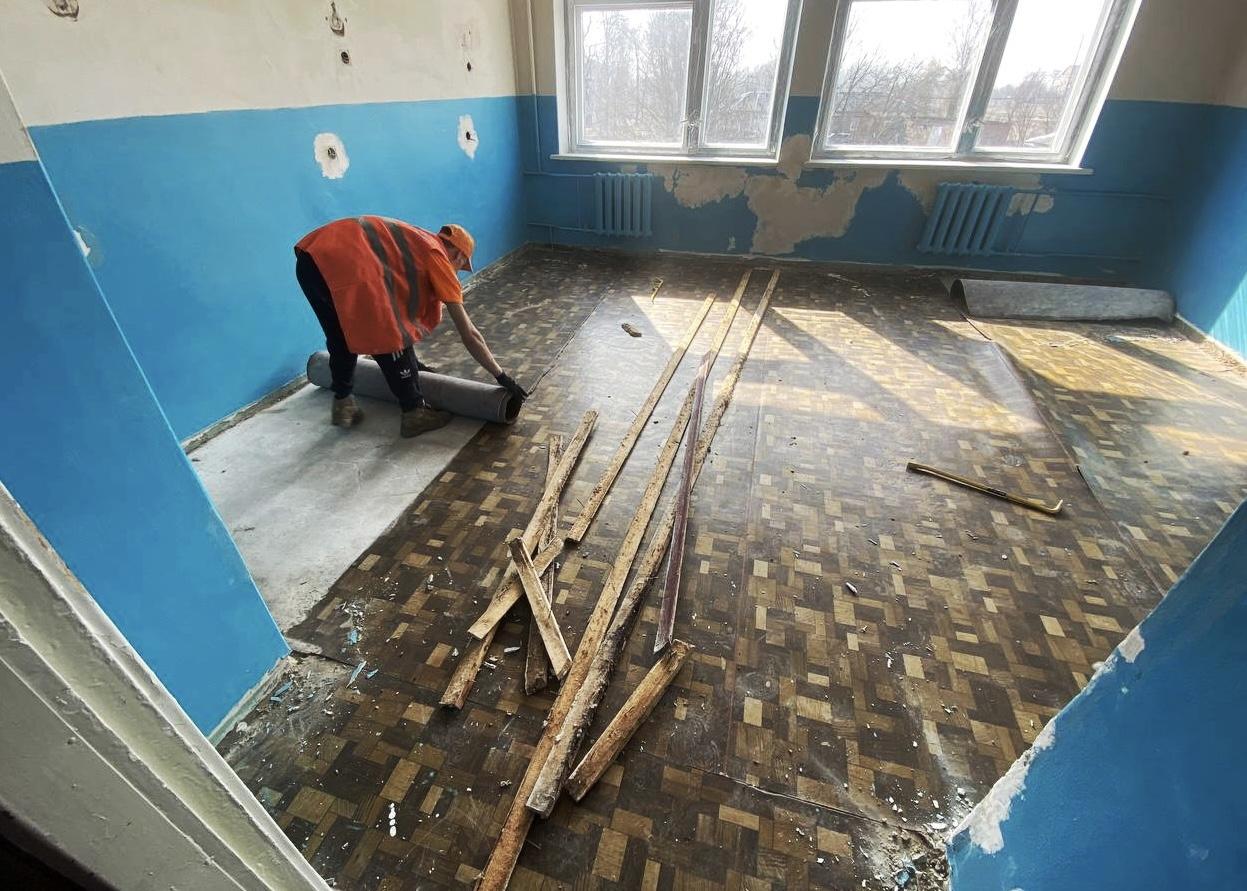
Ukraine: Enabel kicks off the hospital renovation in Pryluky
Taisiia DRUZIUK | 11/03/2025
BE-Relieve Ukraine programme is working to restore and equip cluster hospitals in Ukraine, following Build Back Better principles: sustainability, inclusivity, and energy efficiency. One of the first facilities to be modernised with Enabel's support is the Pryluky Central City Hospital in the Chernihiv region. The institution serves 11 communities in the Pryluky district, reaching more than 150.000 residents. Enabel will finance the major renovation of two floors of the hospital's central building and the replacement of three elevators. More than 30 wards and 5 operating rooms will be renovated. The preparatory work has already begun. “This cooperation gives us a historic opportunity to restore the hospital during this challenging time for our country,” shares Ms. Yana Pohorila, the facility’s director. ”Together, we will create dignified conditions for patient care and medical staff operations.”
-
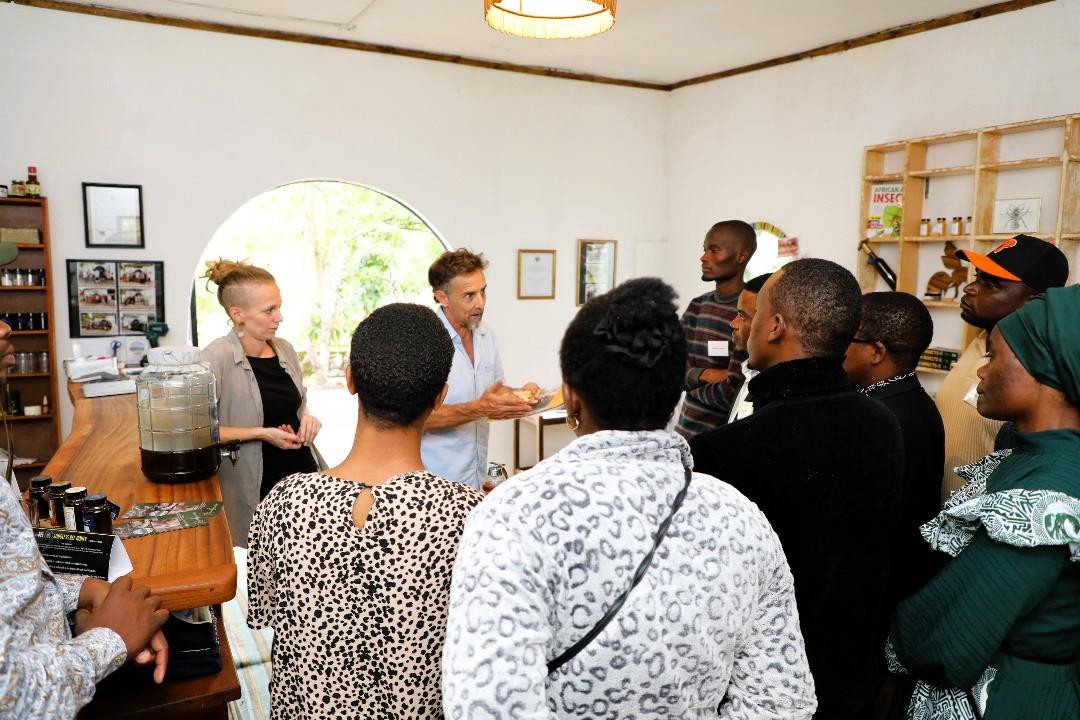
Enhance capacity to conduct Api-tourism in Tanzania
Deogratius KIMENA | 11/03/2025
With the growing awareness and increasing demand for api tourism in Tanzania, Enabel is strengthening the capacity of training institutions both mainland Tanzania (The Beekeeping Training Institute) and Zanzibar (The School of Agriculture under the State University of Zanzibar). This initiative aims to enhance local institutions' ability to support the need of the sector more effectively while leveraging new opportunities in beekeeping, ultimately contributing to the expansion of the country's tourism industry.
-
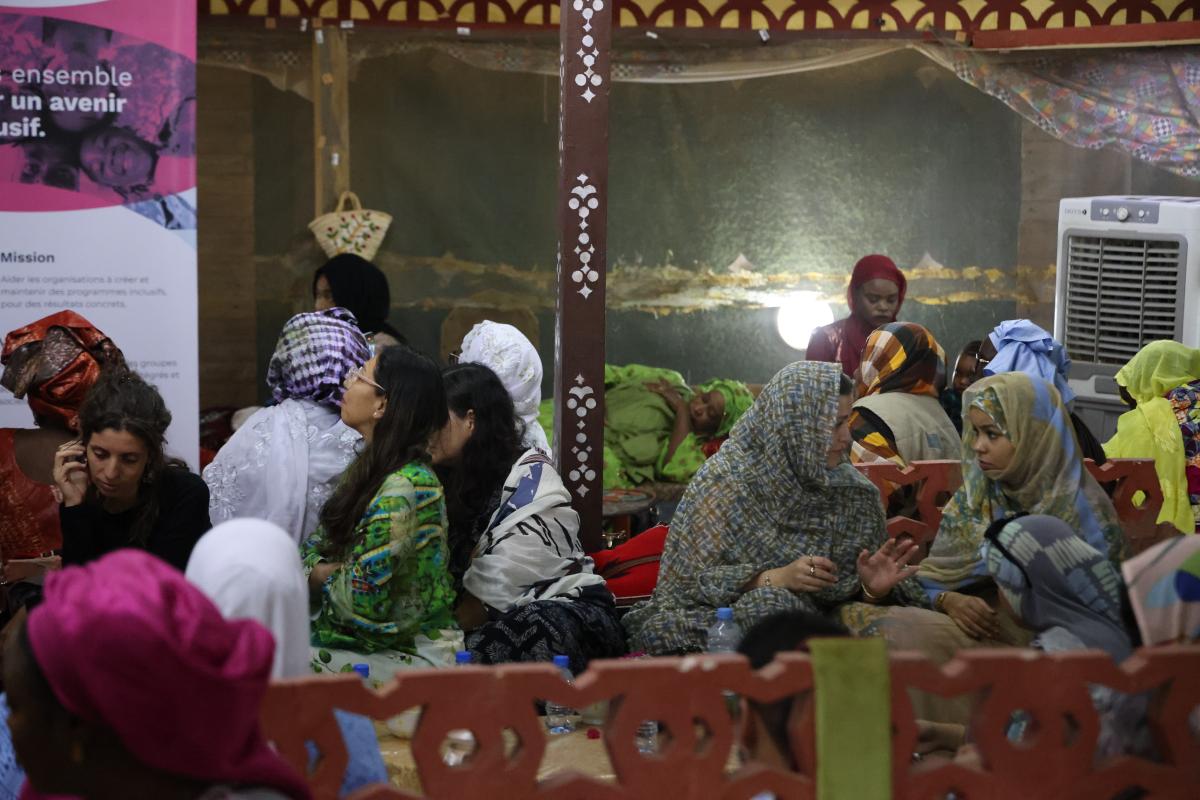
En Mauritanie : Retour sur la Women Owned Business Week
Aminata KANE | 10/03/2025
La Women Owned Business Week s’est achevée en beauté, célébrant l’engagement en faveur de l’entrepreneuriat féminin et la valorisation des femmes rurales en tant qu’actrices centrales de la transformation économique. Debbo Consulting, en partenariat avec Enabel, a su relever le défi de mettre en lumière le rôle essentiel des femmes rurales dans le développement économique local. Leur résilience, leurs compétences et leur détermination inspirent et dynamisent l’économie en valorisant les produits locaux.Clap de fin d'une semaine d’actions et de partagesDes portraits inspirants : chaque jour, nous avons découvert des histoires de femmes rurales engagées qui transforment leur communauté grâce à leur savoir-faire.Des webinaires et des ateliers : des échanges riches avec des expertes autour de l’accès au financement, de la digitalisation et de l’équilibre entre vie professionnelle et vie familiale.Une cérémonie de clôture : une soirée conviviale avec une exposition photos de femmes des zones d’actions d’Enabel, une vente aux enchères et un moment de partage culturel lors de la rupture du jeûne.Cet événement n’aurait pas été possible sans l’initiative précieuse de Debbo Consulting, qui œuvre aux côtés d’Enabel pour promouvoir l’autonomisation économique des femmes rurales en Mauritanie.Investir dans les femmes, c’est construire un avenir plus inclusif et équitable. Ensemble, poursuivons cet engagement !
-

Cultiver la résilience en Mauritanie : Onze barrages pour l’avenir !
Aminata KANE | 10/03/2025
Face à l'insécurité alimentaire et nutritionnelle, les habitants du sud-est de la Mauritanie relèvent le défi grâce au programme RIMDIR financé par l'Union européenne et mis en œuvre par Enabel. Onze barrages ont été construits pour sécuriser l’eau, prolonger la saison des cultures et restaurer les sols. Ces infrastructures permettent d’améliorer les conditions d’élevage et de sécuriser les récoltes, renforçant ainsi la résilience des communautés agricoles. Grâce à ces aménagements, le programme RIMDIR montre que l’agriculture durable et la résilience sont possibles, même dans des zones arides. Découvrez en vidéo comment Enabel transforme les paysages et les vies des populations locales : https://youtu.be/KxNdTcZLeA4?si=XJkPQ90IodKl3R0L.
